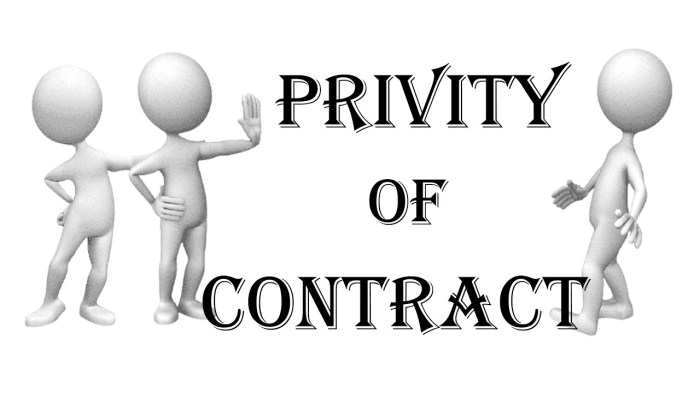Privity of estate vs privity of contract – Privity of estate and privity of contract are fundamental legal concepts that govern the transfer of rights and obligations in real estate transactions. Understanding these distinctions is crucial for navigating legal issues related to property ownership and conveyance.
Privity of estate refers to the relationship between a grantor and grantee, where the grantee assumes the rights and obligations of the property upon transfer. Privity of contract, on the other hand, exists between parties to a contract, such as a buyer and seller, and governs the rights and obligations arising from that specific agreement.
Privity of Estate vs. Privity of Contract: Definitions: Privity Of Estate Vs Privity Of Contract

Privity of estate and privity of contract are two legal concepts that define the rights and obligations of parties involved in real estate transactions. Understanding these concepts is crucial for navigating legal issues related to property ownership and transfer.
Privity of Estate
Privity of estate refers to the relationship between successive owners of the same property. When property is transferred from one owner to another, the new owner (successor in interest) steps into the shoes of the previous owner (predecessor in interest).
This means that the successor in interest acquires all the rights and obligations associated with the property, even if they were not explicitly mentioned in the conveyance.
Privity of Contract, Privity of estate vs privity of contract
Privity of contract, on the other hand, refers to the relationship between the parties to a contract. A contract creates rights and obligations only between the parties who signed it. Third parties who are not party to the contract generally have no rights or obligations under it.
FAQ Summary
What is the difference between privity of estate and privity of contract?
Privity of estate involves the transfer of rights and obligations between a grantor and grantee of property, while privity of contract pertains to the rights and obligations arising from a specific agreement between parties.
When does privity of estate occur?
Privity of estate arises upon the transfer of ownership of real property, where the grantee assumes the rights and obligations associated with the property.
What are the exceptions to the rule of privity of estate?
Exceptions to privity of estate include situations where a third party acquires rights or obligations under a conveyance due to fraud, misrepresentation, or other equitable considerations.

